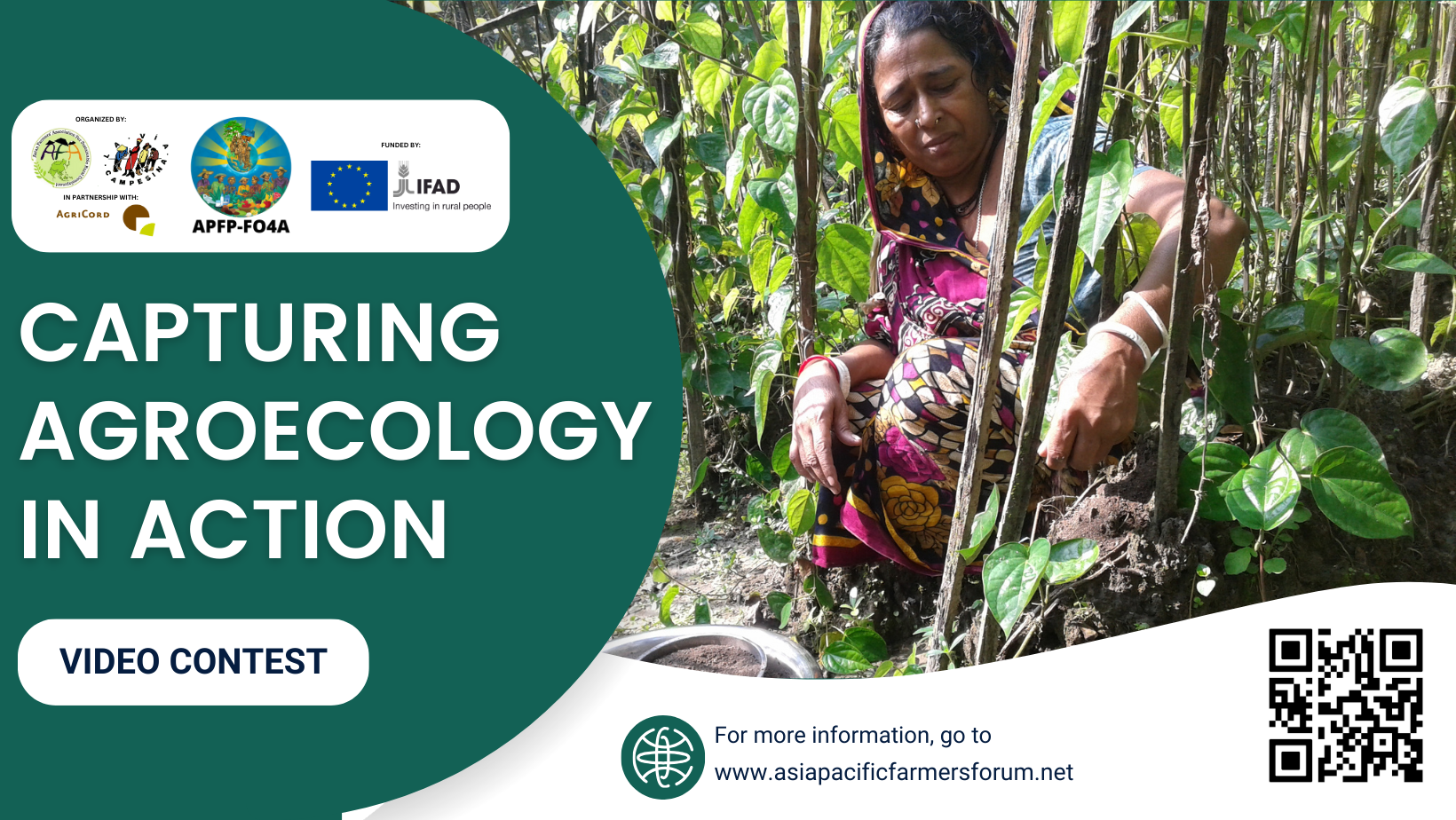
This video contest seeks to spotlight the transformative power of agroecology, focusing specifically on its benefits for farmers’ organizations and agricultural cooperatives. Farmers’ organizations and agricultural cooperatives play a crucial role in promoting sustainable agriculture practices, empowering smallholder farmers, and strengthening rural communities. By showcasing real-life examples and success stories, we aim to inspire and educate audiences about the potential of agroecology to address pressing challenges such as food insecurity, environmental degradation, and rural poverty.
Background
In recent years, there has been growing recognition of the limitations of conventional agricultural practices, which often rely heavily on chemical inputs, monocultures, and unsustainable resource extraction. In contrast, agroecology offers a holistic approach that emphasizes biodiversity, soil health, water conservation, and social equity. By harnessing ecological principles such as natural pest control, crop diversification, and nutrient cycling, agroecological farming systems can improve yields, enhance resilience to climate change, and promote ecosystem health.
Farmers’ organizations and agricultural cooperatives play a pivotal role in driving the adoption of agroecology at the grassroots level. These collective enterprises enable smallholder farmers to access resources, knowledge, and markets, while also fostering solidarity and collective action. By pooling resources and expertise, farmers’ organizations can implement agroecological practices at scale, leading to positive impacts on livelihoods, landscapes, and food security.
Through this video contest, we invite participants to shine a spotlight on the innovative initiatives, inspiring stories, and tangible outcomes emerging from the intersection of agroecology and farmer-led movements. By capturing agroecology in action, we can amplify the voices of farmers, celebrate their achievements, and catalyze positive change toward a more sustainable and just food system for all.
Objective
The objective of this video contest is to showcase how agroecology has positively impacted farmers’ organizations and agricultural cooperatives, emphasizing its benefits for sustainable agriculture, community empowerment, and ecological responsibility
Who Can Join
This contest is open to all farmers, fishers, indigenous peoples, forest users, herders, pastoralists, etc., of all ages and genders who are a member of farmers’ organizations or cooperatives supported by the following programs:
- APFP-FO4A and ARISE programs implemented by the Asian Farmers’ Association for Sustainable Rural Development (AFA) and La Via Campesina (LVC)
- FO4A program implemented by the AgriCord
Contest Mechanics
Create a video highlighting real-life examples and success stories of agroecological practices implemented within farmers’ organizations or agricultural cooperatives. The video should clearly demonstrate how agroecology benefits Farmers’ Organizations and Agricultural Cooperatives.
Content Guidelines
- Showcase how agroecology practices have improved the livelihoods of farmers, enhanced agricultural productivity, and contributed to environmental sustainability.
- Highlight the role of farmers’ organizations and agricultural cooperatives in promoting and implementing agroecological principles, such as biodiversity conservation, soil health improvement, water management, and community engagement.
- Include interviews, testimonials, and footage of farmers, agricultural experts, or community members sharing their experiences and insights on the benefits of agroecology.
- Emphasize the socio-economic, environmental, and cultural impacts of agroecology within the context of farmers’ organizations and agricultural cooperatives.
Video Requirements
- The videos should be in a documentary format/style.
- Duration: The maximum length of the video should be between 1 and 3 minutes.
- Format: The video must be in a standard video format (e.g., MP4, AVI, MOV) and should be of high quality (at least 720p resolution).
- Language: Videos can be in any language but must include English subtitles if the dialogue is in a language other than English.
- Participants may use any video recording device (DSLR camera, video camera, or smartphone) or any video editing software.
- Videos should be original works created specifically for this contest.
Submission Process
- Participants should submit their videos via email to afairish@asianfarmers.org. Each submission must include a brief description (100-200 words) providing context and background information about the video.
- The submission deadline is on 31 August 2024.
- There is no limit to the number of videos submitted from each country.
Judging Criteria
The judging panel will select winners based on these criteria:
- Adherence to the theme and relevance to the benefits of agroecology for farmers’ organizations and agricultural cooperatives.
- Creativity, originality, and storytelling effectiveness.
- Technical quality of the video production, including cinematography, editing, and sound design.
- Overall impact and ability to inspire and educate the audience about the importance of agroecology.
- Online votes (Separate award/not included in the computation for the criteria)
Prizes
Participants will receive certificates and tokens.
All video entries will be featured in promotional materials, publications, and public exhibitions to gain recognition and visibility.
Winners will receive the following prizes:
First Place – USD 1000
Second Place – USD 500
Third Place – USD 300
Special Awards:
Social Media Favorite – USD 250
Award for women-led initiative on agroecology – USD 250
Award for youth-led initiative on agroecology – USD 250
*The prize can be used to fund an exchange visit to another FO, to fund a training/workshop, or to finance their member/staff’s participation in a conference, training, or workshop. Winners can claim their cash prize after submitting a proposal/concept note for any of these activities.

Comments are closed